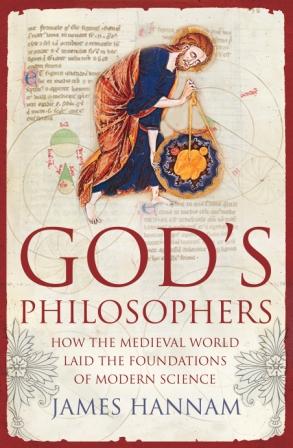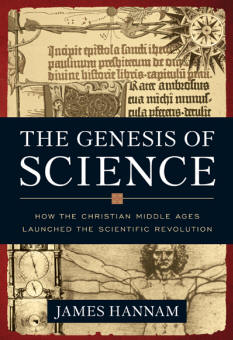
|
If you have enjoyed Bede's Library, you can order my book, The Genesis of Science: How the Christian Middle Ages Launched the Scientific Revolution (US) from Amazon.com or God's Philosophers: How the Medieval World Laid the Foundations of Modern Science (UK) from Amazon.co.uk. |
|
For my latest thoughts on science, politics, religion and history, read Quodlibeta
|
![]()
![]()
![]()
![]()
Fine Tuning in the Language of our Genes
![]()
Introduction
Apart from the physical constants discussed in my article for the Secular Web here, there is another kind of apparent cosmic design that I would like to discuss which is not dependent on physical laws. Instead, it is based on the fact that the language of our genes is meaningful. I have not seen this suggested by theists before but I think it is a valid argument.
The Library of Babel
I would like to start by appropriating some of the language used by Daniel Dennett in his quite brilliant book, Darwin's Dangerous Idea. His ideas are in turn based on a short story by the Argentine writer Jorge Luis Borges which you can read on line here. Imagine a library, they suggest, that contains every possible book. This is the Library of Babel. In an effort to minimise his holding the librarian only accepts books that are five hundred pages long and stipulates that they must all have identical type setting using modern Latin characters. It still contains every possible book but War and Peace is spread over a few volumes.
Shakespeare's lost plays are in this library as are the missing volumes of Livy. Jane Austin's unfinished last novel, Sanditon, is here exactly as she would have written it had she lived. Somewhere in the library is your life story, perfectly detailed, from birth until now. But there are also volumes that continue that biography until you die which contain every possible thing you could do with your life from here on. Your biography is also present translated into Italian and Creole. This essay is there together with all the earlier drafts and the versions I did not write but would have done had I been a more accomplished writer.
Unfortunately, if I let you into the library you would never find a single book that you could read even if you spent your entire life trying. Remember, it contains every possible book and the vast number of these will just contain gibberish - random collections of letters and spaces that mean nothing to us. However enormous the number of possible readable books, even allowing for misprints, bad spelling and missing words, the number containing total rubbish will swamp them utterly.
This will be the case with any language where letters make up words - the number of meaningful books will be a tiny fraction of the total possible. This does not make the language inefficient but it just the way things are. We should also note that unless a language actually exists, none of the books will mean anything at all. The language came first and was not created but finding which combinations of letters could be persuaded to yield some sense. Instead the letters were selected to carry out a function in recording a pre-existent language. There is no reason why a selection of symbols should mean anything unless they are given a meaning. We could invent a language to fit around any collection of symbols but this will only be possible after correspondences between the symbols and meaning have been established.
The Library of Mendel
Let us now consider another set of letters and another vast library - the Library of Mendel. This time we only have four letters (called A, C, G, and T by convention) and twenty words (the different amino acids that make up all the proteins that are needed by our bodies). The Library of Mendel much bigger than the Library of Babel as the volumes (individual genomes) are much longer. The human genome contains 3.2 billion letters. So, I can still assure you that in a life time of searching you would never find a single work in it that makes sense - that is the recipe that can produce a viable living being.
As each work in the library of Mendel is a genome, it contains every possible genome up to the biggest we have here on earth. It contains your genome and mine and that of my pet dog, Stumpy. It even contains what my genome would be if I did not need glasses.
Now we known that there is a language of genes that can be used to describe how to make living things but you would never believe it from browsing in the Library. After looking at a few billion genomes unable to give the recipe for so much as a viable tentacle you might begin to suspect that there was no hidden language in the genes. We might even feel it is a miracle that such a language does exist. Further more, despite the vast number of dead ends, nature has somehow managed to find it.
One point is absolutely vital to grasp at this point - the genetic language could not have evolved. It is instead defined by the rules of chemistry that have existed from the Big Bang. The language of genes is written into the very fabric of the universe itself and the only way to explain it is to explain the universe. What has evolved are self replicating molecules which have come to use the pre existing genetic language to build living things to carry them around.
The analogy with the Library of Babel gives us one plausible explanation - that the machinery of the genetic code was assembled deliberately in order that it could describe a pre existent language. Common sense offers us the same conclusion - if one finds a language, then postulating that a mind created it, makes the language more likely to have occurred. This is another powerful argument for design that I have not heard used much before. But as it says in the Bible, there is nothing new under the sun and this argument has been used before - by David Hume of all people.
In part three of his Dialogues Concerning Natural Religion, Hume puts this argument into the mouth of Cleanthes, his proponent for the design argument.
Suppose, therefore, that you enter into your library, thus peopled by natural volumes, containing the most refined reason and most exquisite beauty; could you possibly open one of them, and doubt, that its original cause bore the strongest analogy to mind and intelligence? When it reasons and discourses; when it expostulates, argues, and enforces its views and topics; when it applies sometimes to the pure intellect, sometimes to the affections; when it collects, disposes, and adorns every consideration suited to the subject; could you persist in asserting, that all this, at the bottom, had really no meaning; and that the first formation of this volume in the loins of its original parent proceeded not from thought and design? Your obstinacy, I know, reaches not that degree of firmness: even your sceptical play and wantonness would be abashed at so glaring an absurdity.
We do indeed find a universal language in DNA with organisms instead of books. But as these organisms are viable we can say that they are 'natural volumes', and who can deny their exquisite beauty. Although this argument is uttered by the character Hume intends to refute, he does not in fact dispute it. Instead the sceptic Philo is discomforted and it is left to the fideist, Demea, to reply. He states that books are too unlike the universe to allow us to us the analogy that the order of the world means it was created by God. But now we have found the universe does indeed contain something very like books in an intelligible language and even Demea's repost is seen to fail.
But we must still consider two counters arguments. Readers familiar with this topic will find them similar to the counters offered against the anthropic coincidences.
Of all the possible genomes, surely there is bound to be something meaningful somewhere?
This objection is similar to the fallacy of the multitude of monkeys with time on their hands. Everyone has heard of Julian Huxley's example of how, given long enough, monkeys randomly banging on typewriters might be expected to produce the complete works of Shakespeare in both the Arden and Riverside editions. But the fact is that they would not produce a single word of Shakespeare or indeed of English unless a language was already existing for the monkeys' literary efforts to be compared to. The same is true of the language of genes except the meaning here is the correspondence between DNA and the amino acids which are the building blocks of life. There is no direct connection between these amino acids and the corresponding DNA - the fact that they do correspond is simply a function of the pre-existing genetic language.
The counter argument really goes, well surely given all the possible genomes, some will just happen to match up to amino acids with which they have no direct chemical connection, which will just happen to build themselves up into proteins, that will just happen to combine into viable living things. So, the problem is that any genome will always be useless without all the attendant chemistry which makes up its meaning (that is the life form it is a recipe for). And the fact that a chemistry should happen to exist which is able to make sense of the genome and further that the chemistry should be able to create life forms is nothing less than mind blowing.
Are complex systems not in some way self organising?
Complexity theory is in its infancy and at the moment consists of nothing much more than complicated mathematical models that may or may not have useful applications to real life. But it is unclear how it could explain the genetic language anyway. Complexity is supposed to show how apparently chaotic and arbitrary things can, taken together, form themselves into a semblance of order. The classic example is the way that water molecules being pulled down the plug hole form into a miniature whirlpool.
With genes there is a different problem. The useful genes are every bit as randomly organised as all the rubbish. Just as in English the actual order of the letters is completely arbitrary without the rules of spelling and grammar to justify them, so the order of bases in a gene have no inherent order outside the meaning assigned to them by the language. If the bases were self organising under complexity theory they would be completely useless as medium for language as they would arrange themselves into patterns rather than the random strings necessary to impart large amounts of information.
Conclusion
We have looked at the genetic code and found that the universe has the rules of a meaningful and useful language built into its very structure. This in turn suggested that, like English, this language has been developed by a mind rather than being the creation of either chance or necessity.
![]()

